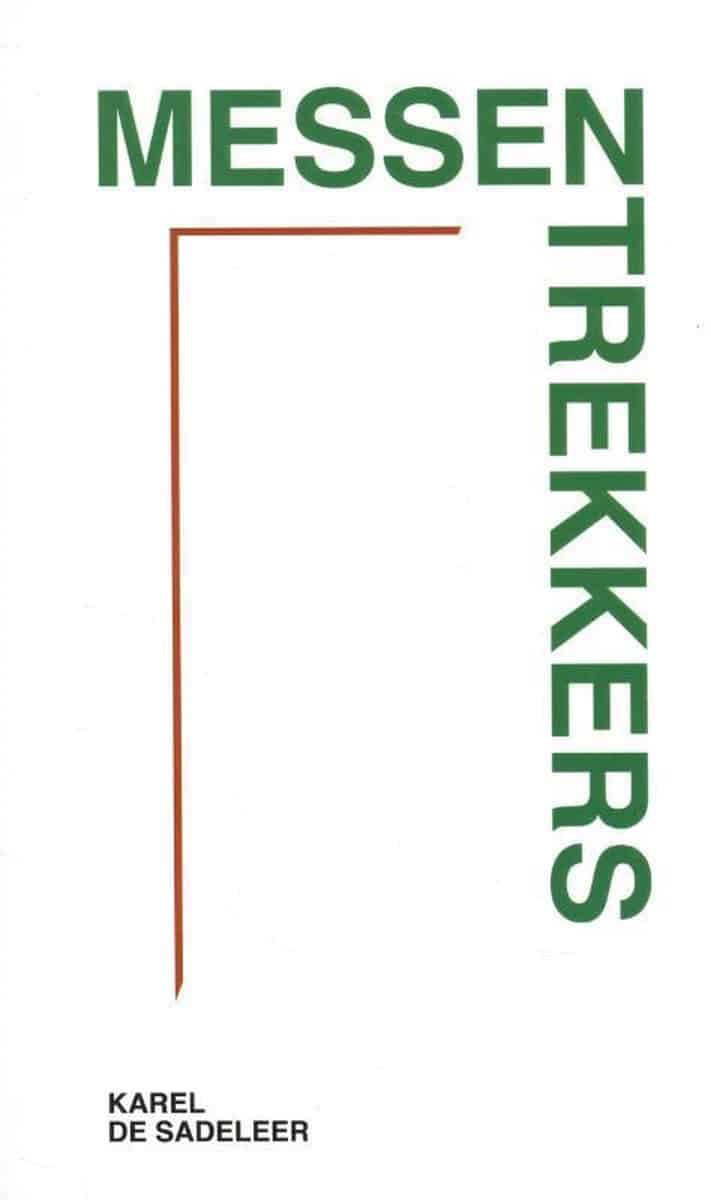‘Messentrekkers’ by Karel De Sadeleer: The Frivolous Story of a Palestinian-Swiss Nomad
In a loud monologue full of metaphors and reflections on life and literature, Karel De Sadeleer tells the story of Ali, a bubbly Swiss with Palestinian roots. Messentrekkers (Cutthroats) is an ambitious, bold debut that displays a rich imagination and an original command of language.
In his early twenties, as a student of Germanic languages, when Karel De Sadeleer was asked about his reading habits, it turned out that he already had his own take on literature. In an interview in the newspaper De Morgen he likened reading to solving a puzzle. The most important thing is not the finished puzzle, but the process itself, De Sadeleer clarified. ‘That’s the coolest thing,’ said the interviewee, adding: ‘I assume that every book has been written with a certain ingenuity behind it. That ingenuity is reflected in the style, the choice of words, the structure of the book.’
 Karel De Sadeleer
Karel De SadeleerDe Sadeleer’s view of literature seems not to have changed much in the past twenty years, at least not if his debut novel Messentrekkers (Cutthroats), published at the end of 2020, is anything to go by. The book is a puzzle that readers can enjoy for a few hours, without the end result being more important than the distance travelled. That road takes you past wondrous metaphors, deliciously exorbitant use of language, digressions on history and literature, all wrapped up in a hurried monologue by a man who sometimes can barely follow his own thoughts.
The book is narrated by Ali Haniyeh, a Swiss of Palestinian heritage, who eventually found himself in Ghent. There he spends his days outside on a little terrace, listening to the girls sat near him (always girls, never boys). Looking out over the streets of Ghent, he notices the Palestinian leader Mahmoud Abbas, who is pedalling through the city on a purple ladies’ bicycle. Reason enough for Ali to launch into a story that only comes to a halt two years and 420 pages later, in a grand finale in which Ali himself and Abbas play the lead roles. And yet, you feel as though you never left the terrace, that this story never really ends.

There, on that terrace, we listen to Ali’s life story. His father, who had fled Palestine, became a gravedigger in Geneva. Just as he was digging the grave of the exiled Argentinean writer Jorge Luis Borges, he was attacked by a loner with a knife, an “attack” that was never cleared up. That anecdote alone is material for various stories and reflections on literature, of which Ali does not always have a high opinion. Just like the motto on Borges’s tomb: “Be not afraid.” “That’s no life lesson, writer, just complete bollocks in terms of advice on style,” assesses Ali. Anyone who reads too much will get a hunchback anyway. We also hear how little Ali moved to Ghent with his mother. And how Ali returned to Switzerland alone, how he found temporary work as a taxi driver in Berlin.
Ali’s monologue is a sequence of utter nonsense and nuggets of wisdom, told with a great sense of timing and humour.
During that monologue we meet his friends, who have names like Beyeler, Rheinsberger or Ravelstein, not by coincidence all very Jewish sounding. De Sadeleer has a penchant for Jewish folklore, which permeates the book.
Ali’s monologue is a sequence of utter nonsense and nuggets of wisdom, some more profound than others, told with a great sense of timing and humour. Anyone who expected a Palestinian story after the introduction of Mahmoud Abbas in the first paragraph will be in for a surprise. This is a nomadic world story that literally takes off in all directions. Boredom does not get a look-in.
And yes, of course, in a debut of more than 400 pages, a metaphor or two can go wrong. And Ali’s obsession with girls’ fannies and their influence on boys and their willies is sometimes somewhat adolescent due to a slight overkill. Every now and then De Sadeleer could have killed a few darlings, but this being a debut we would not want to hold that against him.
It is a roaring story, full of thunderous sentences and striking, original images
It is nevertheless a roaring story, full of thunderous sentences and striking, original images, such as that of Dampoort station, ‘where the rain sometimes catches the train to Brussels-Central.’ It is a book full of mirrors, because there may be several Alis, and perhaps several Abbasses as well.
It is a story about how fear, despite Borges’ motto, is ultimately at the core of everything. A universal story of landing in trouble and how to find your way out again. It is a story about a runaway, fickle imagination, and how assumptions and ruminations can become an avalanche that buries you. Because all those inventions gnaw away at your memories until they slowly drive you mad.
An excerpt from 'Messentrekkers', as translated by Paul Vincent
pp. 53-55
Who’s that Arafat then, she said, twisting her little finger in her ear, like a corkscrew, so that with the lighted end of her cigarette, which she was holding between her index and middle fingers, she almost set fire not to her eyelashes, but to the baby hair above her temples.
Arafat is who Mahmud Abbas should be, I said, but Mahmud Abbas isn’t Arafat, because he can’t be.
A leader for the whole people, said the girl.
Yes, I said, a leader for the whole people. For the greengrocers in Jenin, for the water carriers in Zubaydat, for the whores in Nablus, for the stone-throwers in Gaza City, for the retired schoolmasters of the village school in Al-Eizariya and for the nurses in Khan Younis.
And they also say about that Arafat that he had his fingers in the cookie jar while the people had their attention on something else, said the girl.
That’s just how it is, I said. First, he looked to see what was in the cookie jar – that’s what some voices among the people say at least – and then he rummaged about in it until his fingers were crooked.
With the little finger which just before she had twisted in her ear in order to dig up copper-coloured smear or a question which had bedded down in the snug confines of her inner ear, she now rubbed her top lip.
Anyway, I said, that is what the people say and write.
The people often write both one thing and another, said the girl.
That’s true, I said, and if it’s not that for years Palestinian money has been disappearing into the Palestinian pockets of the bespoke Palestinian suits of the Palestinian leaders, then it’s something else.
The money shouldn’t be in the pockets of the Palestinian leaders at all, said the girl, and although she was right, although she admitted I was right, although the right-ness swirled around the terrace like a bunch of leaves swirls around the eye of an embryonic hurricane in autumn, I still felt the conversation was going nowhere as it was stuck, around an eye, for example, the eye of an embryonic hurricane that suddenly blows up and just as suddenly subsides, from weariness or disgust at the damage it will do, and if the conversation was going somewhere, after all, hours away from us, perhaps until the following morning, then I would have been smashed out of my head, like a sloop in a storm at sea – the night a sea and the terrace a languid surf onto which it smashes sloops.
That’s true, I said nevertheless, in the hope that that would bring the conversation to a speedy end, the money shouldn’t be there, but meanwhile, it is. And so the courage of the Palestinian people sinks into its worn-out shoes while it demonstrates against the colonisers of the country that is divided like a cake into ever smaller portions.
A cake, said the girl.
A cake, I said.
What kind of cake is it then, she said.
If someone asks me what kind of cake it is, I said, a whipped cream biscuit, for example, or a banana cake or a big fruit cake decorated with kakis and Sharon fruit and the segments of an orange, I say that it’s not the kind of cake that lands on a festive table here in Flanders. No, I say, it’s an intifada cake, baked on the occasion of the bar mitzvah of the sons of the gods. Or better: two intifada cakes. The first of them stuck in the throats of the children of the gods, I have the feeling. The second did not come till later. It was no less light, but was fed in little pieces. Like you feed a cake to a little child who’s celebrating its fifth birthday and still has all its milk teeth.
At that moment a boy appeared on the terrace. He was old enough for the street, I could see that from his moustache. He gave his darling a kiss and as that were a sign, she lifted her arse, her fat arse, said something that sounded like bye and they left.
Karel De Sadeleer, Messentrekkers, het balanseer, 2020, 432 pp.












